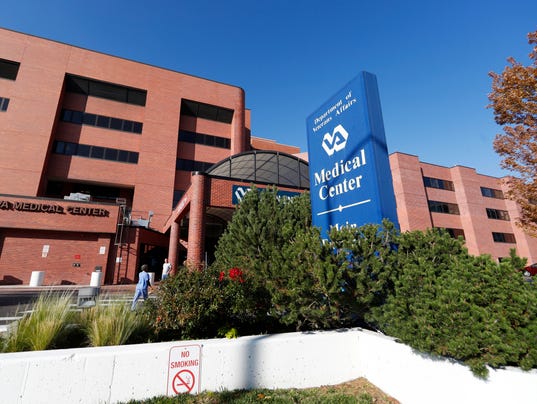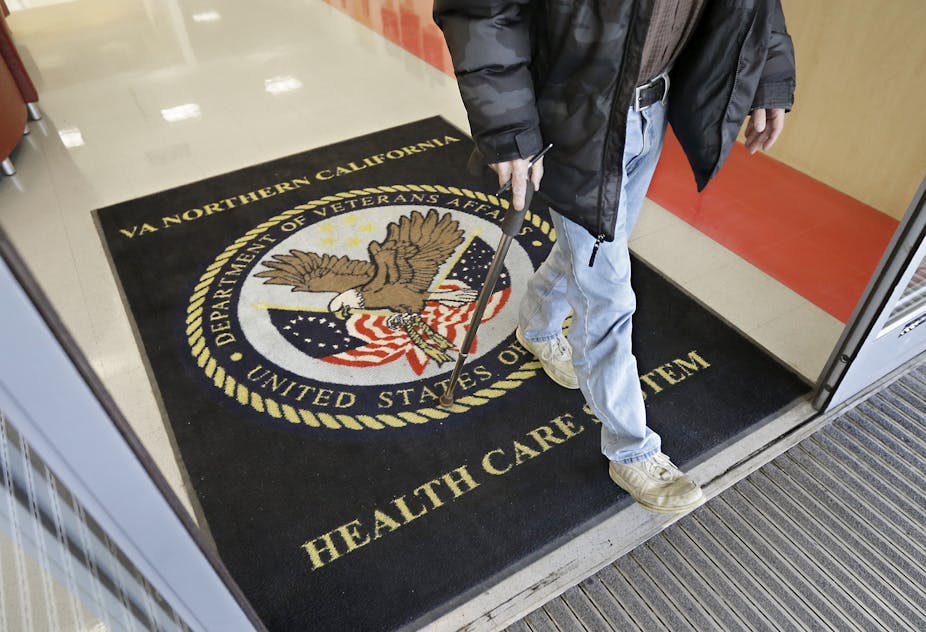
President Trump’s dismissal of David J. Shulkin, the secretary of veterans affairs — and the nomination of a Navy doctor with no known policy views to take his place — has brought renewed focus to an increasingly contentious debate over whether to give veterans the option of using the benefits they earned through military service to see private doctors rather than going to government hospitals and clinics.
The issue, which has pitted almost every major veterans group against Concerned Veterans for America, an advocacy group funded by the billionaire conservative brothers Charles G. and David H. Koch, and its allies, has been at the center of months of intrigue at the sprawling Department of Veterans Affairs, which is charged with caring for the United States’ 20 million veterans.
But Mr. Shulkin’s departure and the abrupt elevation of Dr. Ronny L. Jackson, the White House physician, to the department’s top job on Wednesday have raised new fears among Democrats and groups like the Veterans of Foreign Wars and the American Legion. They worry that the Trump administration will push for a major change in veterans’ health care that they have bitterly opposed.
The groups say the end result would be disastrous, effectively bleeding to death a network of 1,700 hospitals and clinics that has taken decades to build.
Dr. Shulkin, who was dismissed Wednesday evening by presidential tweet, argued in an op-ed article in The New York Times and in a subsequent interview on Thursday that such radical restructuring of veterans’ health care would not work.
He said that a middle path that he had tried to pursue — investing in the department’s own health care system while offering veterans more, though not unfettered, access to private doctors — had been rejected by Trump administration officials interested in rewarding private individuals and companies with a windfall in government money.
“They saw me as an obstacle to privatization who had to be removed,” he wrote in one of the most forceful statements offered yet by a fired Trump administration official.
Senior White House officials offered a different rationale for his firing that was based more on a damaging report about Dr. Shulkin’s use of government funds on a trip to Europe released last month than on a dispute over policy.
Lindsey Walters, a deputy White House press secretary, told reporters aboard Air Force One on Thursday that the nomination of Dr. Jackson should not be interpreted as a signal that Mr. Trump wants to privatize veterans’ health care.
But Mr. Trump seemed to renew those concerns just a short time later, promising in a speech in Ohio that he was going to ensure that veterans “have choice,” harkening back to a campaign promise to enact something like the Koch-backed plan.
Veterans advocates are especially concerned that Dr. Jackson, a rear admiral in the Navy who has no real management or political experience in a large bureaucracy, will be pushed around or, worse, simply co-opted by officials in the administration set on drastically expanding private care.
“We don’t know what his agenda is. We don’t know what his views are,” said Verna L. Jones, the executive director of the American Legion. “No one has had an opportunity to talk to him.”
“Of course we are nervous,” she added.
Leaders of the older, congressionally chartered veterans groups like the Legion are not categorically opposed to easing restrictions on private care, particularly in cases where veterans are facing long wait times and subpar facilities. About 30 percent of veterans’ appointments are currently made with private health providers for those reasons.
But the groups prefer tweaking programs already in place while at the same time addressing the problems that made private care necessary.
John Hoellwarth, the communications director for Amvets, said he thought the first response of most veterans groups to Dr. Jackson was to search for him online.
Dr. Shulkin said that he had been friendly with Dr. Jackson for several years — both men also served in the Obama administration — and encouraged him to go through the interview process to lead the department’s health system this year. Still, he said that he thought concerns about Dr. Jackson’s résumé were justified.
“There is no question about it, but I can’t imagine any job that prepares you for this type of job,” Dr. Shulkin said.
By most accounts, Dr. Shulkin’s rapid fall began as he increasingly butted heads with other Trump administration official over how to approach the expansion of private care. The officials — who included the department’s press secretary and assistant secretary for communications — came to consider Dr. Shulkin as an obstacle and repeatedly tried to have him removed.
Many of those officials, several of whom have ties to the Concerned Veterans group, are still in the administration and are likely to have increased sway in the department. But the ultimate decision about the structure of the department’s health care most likely resides on Capitol Hill, where lawmakers have been struggling for almost a year with the issue.
“I think that there was a miscalculation that if you could get rid of the secretary who is a moderate that things will fall in place, and I just don’t think that is going to happen,” Dr. Shulkin said.
Dan Caldwell, the executive director of Concerned Veterans for America, strenuously disputed Dr. Shulkin’s analysis and said the secretary was using privatization as a “straw man” to distract from his own ethical lapses.
“The president has said he supports full V.A. choice,” Mr. Caldwell said. “The president would not have selected Admiral Jackson if he did not believe he supports his full agenda.”
Mr. Caldwell was referring to a damning report released in February by the department’s inspector general that found “serious derelictions” related to a trip Dr. Shulkin took last year to Britain and Denmark. It concluded that he had spent much of the trip, which cost more than $122,000, sightseeing and that he had improperly accepted Wimbledon tickets as a gift.
Dr. Shulkin has continued to deny any wrongdoing, and on Thursday blamed his political opponents in the department for the investigation itself.
“This is 100 percent about the politics and this is the way that people fight their battles in Washington rather than having intellectually honest discussions,” he said.
The White House did not view it that way. Senior officials came to believe that Dr. Shulkin had misled them in the run-up to the report’s release. His public declarations of innocence only further aggravated top officials, who felt he had too openly aired internal politics with news outlets and had repeatedly opened the White House to criticism.
The exact circumstances surrounding Dr. Shulkin’s firing, and exactly how much the White House chief of staff, John F. Kelly, was aware of it, remained unclear.
One person with direct knowledge of the events said Dr. Shulkin had called Mr. Kelly around 10:30 a.m. Wednesday, asking if he were about to be fired. Mr. Kelly told that him he did not know, and that he would get back to him.
A White House official would not discuss the details of what took place, beyond saying that Mr. Kelly had called Dr. Shulkin to accept his resignation, and that the secretary gave it.
Dr. Shulkin declined to discuss the episode in detail, but said he did speak on the phone with Mr. Trump on Wednesday about the progress of various policy initiatives at the department and implied that his job status did not come up.
A few hours later, he was at home on the phone with his wife when she broke the news: the president had fired him in a tweet.








